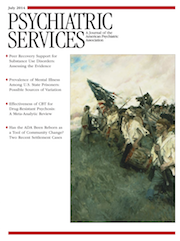Potentially Preventable Medical Hospitalizations Among Maryland Residents With Mental Illness, 2005–2010
Abstract
Objective
The goal of this study was to assess the association between mental illness and potentially preventable ambulatory care–sensitive (ACS) hospitalizations among children, adults, and older adults.
Methods
This was a retrospective, cross-sectional study that used 2005–2010 Maryland hospital discharge data (N=508,142 hospitalizations). Logistic regression was used to assess the associations between mental illness and ACS hospitalizations.
Results
Any mental illness diagnosis was associated with heightened odds of ACS hospitalization in all three age groups. Any mental illness diagnosis was associated with 84% higher odds of ACS hospitalization among children, 32% higher odds of ACS hospitalization among adults, and 30% higher odds of ACS hospitalization among older adults.
Conclusions
Mental illness was associated with increased odds of ACS hospitalization across the life span. Future research should examine the potential for integrated medical and behavioral health care models to address the poorly controlled somatic conditions that lead to ACS hospitalizations among persons with mental illness.



